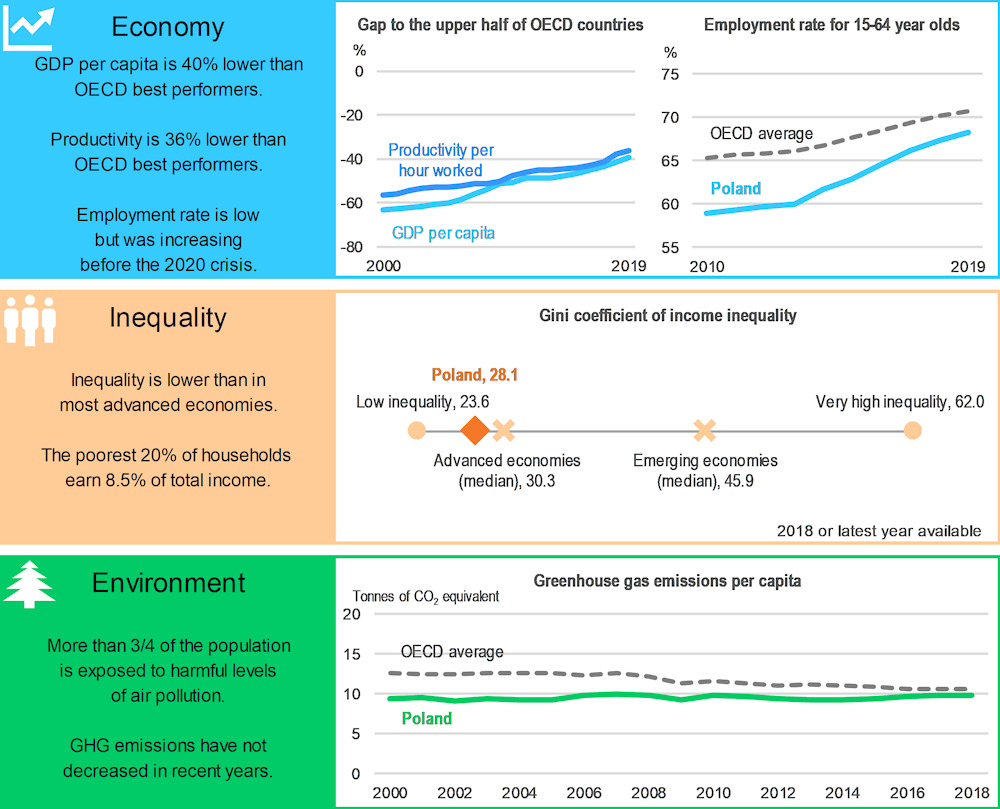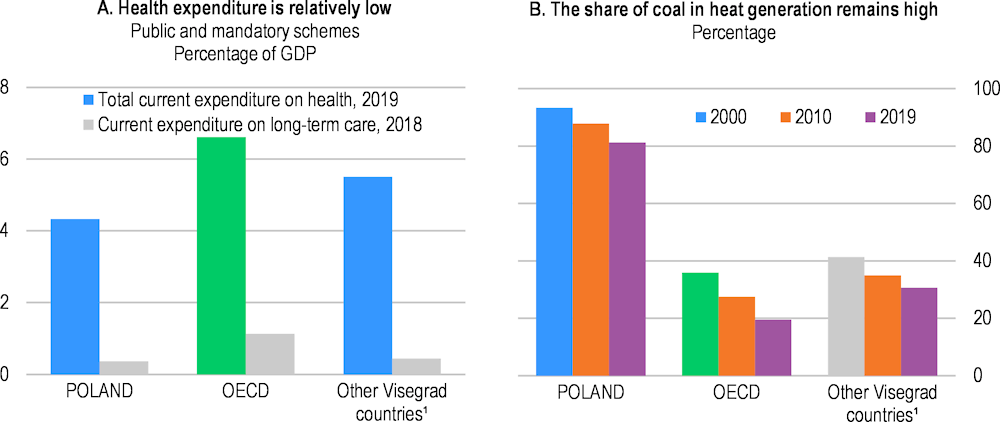The COVID-19 crisis has exposed long-standing issues in the health care sector, including the vulnerability of the population to respiratory illnesses linked to high air pollution. The main medium-term challenges are linked to the shortages of skilled workers and prevalence of micro and smaller firms with low productivity and weak connections to local, national and international markets. Addressing such challenges is key for digital and green transitions and ensuring their inclusiveness.
Economic Policy Reforms 2021

Poland
Poland: Performance prior to the COVID-19 crisis

Economy: Percentage gap with respect to the population-weighted average of the highest 18 OECD countries in terms of GDP per capita (in constant 2015 PPPs).
Inequality: The Gini coefficient for disposable income measures the extent to which the distribution of disposable income among households deviates from perfect equal distribution. A value of zero represents perfect equality and a value of 100 extreme inequality.
Environment: Greenhouse gas (GHG) emissions include emissions or removals from land-use, land-use change and forestry (LULUCF). A high exposure to air pollution refers to above 10 μg/m3 of PM2.5.
Source: Economy: OECD, National Accounts, Productivity and Labour Force Statistics Databases; Inequality: OECD, Income Distribution Database and World Bank, World Development Indicators Database; Environment: OECD, Environment Database and United Nations Framework Convention on Climate Change (UNFCCC) Database.
Skills and productivity growth will be key in facing future challenges
The pandemic has put the healthcare system under heavy strain. Spending on healthcare and long-term care has been relatively low over the past decades (Panel A) and together with the high prevalence of risky behaviours has led to weak health outcomes. Strengthening primary care, long-term and social care and prevention campaigns would avoid costly hospitalisations, improve the referral system and reduce waiting lists.
Shortages of skilled labour were already a key impediment to growth before the crisis and are likely to hinder digitalisation and greening of the economy where new skills will be needed. To facilitate labour reallocation toward new technologies while at the same time avoiding the scarring effects of the pandemic, education and training need to be strengthened. The adoption of individual training accounts, making training rights portable from job to job, would promote lifelong learning, particularly among the unemployed and workers on temporary contracts who are more likely to be low-skilled and disengaged from learning. This would also help increase the employment rate of older workers by improving their working opportunities, notably those at greater risk of being displaced in carbon-intensive regions and industries. To boost the quality and availability of training programmes, multi-annual co-financing schemes should be dedicated to developing workplace-based vocational training programmes, adapted to local labour market needs. The new system to certify training providers should be evaluated and expanded, along with the publicly-available database providing information about training opportunities.
The general availability of skills needs to be enhanced through greater labour market participation of women and older workers. To this end, continuing to improve access to childcare, adapting it to the working hours, and developing long-term capacities would encourage less-qualified parents to return to work and improve the opportunities for children of lower-educated parents to develop skills in the future. In the medium-term, harmonising employment protection for all age groups would avoid disincentives to hiring older workers, who are currently better protected.
Air pollution, largely explained by the use of poor quality coal and biomass in the housing sector (Panel B), contributes to the poor health outcomes. Government support for energy efficiency and renewable energy, as well as investment in modernising electricity grids and district heating networks, would help reduce emissions and could be an effective stimulus for the recovery. Tightening regulations on energy consumption in buildings and deploying tax incentives, subsidies and awareness campaigns would put the economy on a path to reduce the high level of greenhouse gas emissions.
Poland: Vulnerabilities and areas for reform

1. Average of Czech Republic, Hungary and Slovak Republic.
Source: Panel A: OECD, Health Database; Panel B: International Energy Agency, Electricity Information 2020 Database.
Burdensome and non-transparent administrative and regulatory procedures risk hindering private investment and the reallocation of capital and skills – key requirements for a swift, job-rich recovery but also to face future shocks and adapt to a low-carbon economy, facilitating the reallocation of stranded assets. With the recovery underway, streamlining court proceedings, and in particular bankruptcy procedures, would facilitate contract and payment enforcement as well as help to face the potential increase in insolvencies resulting from the pandemic. At the same time, setting up a new firm faces too many regulatory requirements and some services professions, such as lawyers and notaries, still face relatively high barriers to entry.
Poland: Summary of Going for Growth priorities and recommendations
|
2019-2020 Reforms |
Recommendations |
|---|---|
|
Education and skills: Promote participation in lifelong learning |
|
|
☑ The general part of the Integrated Skills Strategy (ZSU) has been adopted in 2019. The detailed part is currently being developed with the support from the OECD. |
□ Consider the adoption of individual training accounts to make training rights portable and favour labour reallocation. □ Dedicate multi-annual co-financing schemes to develop workplace-based vocational training programmes adapted to local needs and increase training offer and take-up. □ Evaluate and expand the new system to certify training providers and the public database providing information about training opportunities. |
|
Labour market: Increase the labour force participation rate of older workers and women |
|
|
☑ In 2019, eligibility for the 500+ family benefit was extended, eliminating the potential negative effect of its initial means-testing. ☑ The 2020 reform to the Maluch (toddler) programme should create more places in nurseries and increase pre-school enrolment rates. |
□ Progressively align male and female statutory retirement ages and increase them in line with healthy life expectancy gains; review survivor pension schemes to increase incentives to work. □ Harmonise employment protection for all age groups to avoid disincentives to hiring older workers who are currently better protected. □ Continue to improve access to affordable childcare and adapt it to the working hours of less skilled workers to encourage less-qualified mothers to return to work. □ Continue to strengthen ties with the large expatriate community to attract returning emigrants by developing an online hub to advertise jobs, training, business and research opportunities abroad. |
|
Environmental policy: Reduce air pollution levels and carbon emissions |
|
|
☑ In 2020, the cap on electricity prices was removed to incentivise the transition to greener alternatives. |
□ Impose minimum requirements for reserve funds in multi-flat building renovation. □ Tighten regulations on energy consumption in buildings. □ Ease eligibility conditions to energy efficiency programmes for low-income households. □ Provide incentives for the use of smart meters □ Invest in renewable energy and grid modernisation. |
|
*Healthcare: Improve efficiency in health and long-term care* |
|
|
*New priority * |
□ Use the planned increase in health spending to strengthen primary care and prevention campaigns to avoid costly hospitalisations. □ Strengthen information campaigns on behavioural risks, such as food and drinking habits, and review food and health standards. □ Increase vaccination rates, notably for people over age 65, through well-targeted information campaigns. □ Expand the care coordination programmes and the elements of pay-for-performance to all health and social care areas. Clearly define competencies and responsibilities at all levels. □ Improve working conditions in the health sector to attract and retain workforce. |
|
Competition and regulation: Ease business regulations and improve bankruptcy proceedings |
|
|
☑ In 2020, a new regulation on late payments was introduced that sets legally binding deadlines for payments to help address arrears. ☑ Starting from March 2021, it will be possible to create a simplified joint stock company with lower capital requirements, on-line registration in 24 hours and light procedures for dissolution. |
□ Streamline court proceedings and simplify Electronic Invoicing Systems to facilitate the reallocation of resources, contract and payment enforcements. □ Lower barriers to entry for some services professions, such as lawyers and notaries, to increase competition. □ Involve stakeholders in the design of regulations through early consultation procedures and conduct systematic ex-ante evaluations to lower the administrative burden that results from frequent law changes. |
Recent progress on structural reforms
Progress in terms of structural reforms has been uneven with parliamentary and presidential elections in 2019 and 2020, and the COVID-19 recession related temporary and exceptional support measures to protect incomes and jobs.